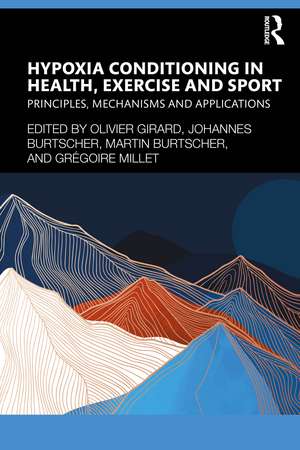Hypoxia Conditioning in Health, Exercise and Sport: Principles, Mechanisms and Applications
Editat de Olivier Girard, Johannes Burtscher, Martin Burtscher, Grégoire Milleten Limba Engleză Paperback – 30 sep 2024
This cutting-edge book examines how positive physiological adaptations not only acutely enhance tolerance to hypoxia but can also induce sustained health benefits. This has enabled the development and refinement of approaches utilizing hypoxia, strategies also termed hypoxia conditioning, to improve health and performance outcomes.
By linking research with recommendations for real-world situations, this volume will serve as an invaluable resource for students, academics, exercise science professionals and sports medicine specialists, especially those in environmental physiology and coaching subjects.
| Toate formatele și edițiile | Preț | Express |
|---|---|---|
| Paperback (1) | 311.62 lei 3-5 săpt. | +23.39 lei 7-13 zile |
| Taylor & Francis – 30 sep 2024 | 311.62 lei 3-5 săpt. | +23.39 lei 7-13 zile |
| Hardback (1) | 1011.64 lei 6-8 săpt. | |
| Taylor & Francis – 30 sep 2024 | 1011.64 lei 6-8 săpt. |
Preț: 311.62 lei
Nou
Puncte Express: 467
Preț estimativ în valută:
59.63€ • 62.13$ • 49.37£
59.63€ • 62.13$ • 49.37£
Carte disponibilă
Livrare economică 13-27 martie
Livrare express 27 februarie-05 martie pentru 33.38 lei
Preluare comenzi: 021 569.72.76
Specificații
ISBN-13: 9781032515724
ISBN-10: 1032515724
Pagini: 336
Ilustrații: 78
Dimensiuni: 156 x 234 x 21 mm
Greutate: 0.47 kg
Ediția:1
Editura: Taylor & Francis
Colecția Routledge
Locul publicării:Oxford, United Kingdom
ISBN-10: 1032515724
Pagini: 336
Ilustrații: 78
Dimensiuni: 156 x 234 x 21 mm
Greutate: 0.47 kg
Ediția:1
Editura: Taylor & Francis
Colecția Routledge
Locul publicării:Oxford, United Kingdom
Public țintă
General, Postgraduate, Professional, Undergraduate, and Undergraduate AdvancedCuprins
1. Hypoxia: The Basics
2. Mechanisms of Intermittent Hypoxia Health Benefits
3a. Ischemic Preconditioning: A Practical Tool for Enhancing Exercise Performance
3b. The Voluntary Hypoventilation at Low Lung Volume (VHL) Method
4. Historical Development of Altitude Training and Hypoxic Conditioning
5. Neurodegenerative Diseases
6. Spinal Cord Injury
7. Psychiatric Diseases
8. Hypoxemia, Pulmonary Disorders, And Hypoxia Conditioning
9. Hypoxia and Obesity
10. Metabolic Disorders, i.e., Metabolic Syndrome and Type 2 Diabetes
11. Intermittent Hypoxia Conditioning for Therapy of Systemic Hypertension
12. Intermittent Hypoxia: Effective Systemic Modality for Cardiac Rehabilitation
13. Load-Compromised Individuals
14. Applications from Before Birth to High Age
15. Hypoxia Conditioning for Pre-Acclimatization Before Going To High Altitude (i.e., Hiking, Skiing, Trekking, Climbing)
16. Altitude/Hypoxic Training for Endurance Athletes
17. Altitude Training in Team-Sport Athletes
18. Hypoxic Training for Strength Enhancement
19. Hematological and Doping Issues
20. Potential Downsides of Intermittent Hypoxia – Immune Function, Inflammation, and Oxidative Stress
21. Combination with Temperature Changes
22. Intermittent Hypoxia-Hyperoxia: Mechanisms and Clinical Application
2. Mechanisms of Intermittent Hypoxia Health Benefits
3a. Ischemic Preconditioning: A Practical Tool for Enhancing Exercise Performance
3b. The Voluntary Hypoventilation at Low Lung Volume (VHL) Method
4. Historical Development of Altitude Training and Hypoxic Conditioning
5. Neurodegenerative Diseases
6. Spinal Cord Injury
7. Psychiatric Diseases
8. Hypoxemia, Pulmonary Disorders, And Hypoxia Conditioning
9. Hypoxia and Obesity
10. Metabolic Disorders, i.e., Metabolic Syndrome and Type 2 Diabetes
11. Intermittent Hypoxia Conditioning for Therapy of Systemic Hypertension
12. Intermittent Hypoxia: Effective Systemic Modality for Cardiac Rehabilitation
13. Load-Compromised Individuals
14. Applications from Before Birth to High Age
15. Hypoxia Conditioning for Pre-Acclimatization Before Going To High Altitude (i.e., Hiking, Skiing, Trekking, Climbing)
16. Altitude/Hypoxic Training for Endurance Athletes
17. Altitude Training in Team-Sport Athletes
18. Hypoxic Training for Strength Enhancement
19. Hematological and Doping Issues
20. Potential Downsides of Intermittent Hypoxia – Immune Function, Inflammation, and Oxidative Stress
21. Combination with Temperature Changes
22. Intermittent Hypoxia-Hyperoxia: Mechanisms and Clinical Application
Recenzii
“The book is an outstanding resource for any teacher, student, medical doctor, coach, physiotherapist, athlete and patient willing to extend his/her knowledge in a broad range of existing hypoxic strategies to improve various pathological states and sport performance.”
Louise Deldicque, Professor in Exercise Physiology and Sport Nutrition at UCLouvain, Belgium
Louise Deldicque, Professor in Exercise Physiology and Sport Nutrition at UCLouvain, Belgium
Notă biografică
Olivier Girard is a professor at the University of Western Australia, researching the mechanisms and adaptations that influence health and performance during physical activity in adverse environmental conditions (heat and altitude). (https://www.oliviergirard.com/)
Johannes Burtscher is a neurobiologist investigating oxygen availability and consumption in humans and animals, with a focus on mitochondrial physiology in the brain and in brain-aging.
Martin Burtscher is a retired professor in sports science and sports medicine at the University of Innsbruck, Austria.
Grégoire Millet is a professor in exercise and environmental physiology at the University of Lausanne, Switzerland.
Johannes Burtscher is a neurobiologist investigating oxygen availability and consumption in humans and animals, with a focus on mitochondrial physiology in the brain and in brain-aging.
Martin Burtscher is a retired professor in sports science and sports medicine at the University of Innsbruck, Austria.
Grégoire Millet is a professor in exercise and environmental physiology at the University of Lausanne, Switzerland.
Descriere
This book delivers an understanding of systemic and molecular mechanisms involved in hypoxia adaptations and examines forms of hypoxia conditioning with a view to create performance-enhancing strategies for athletes and an examination on clinical applications for pathologies.
